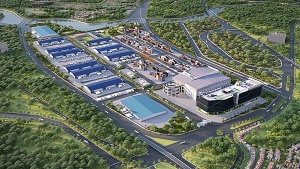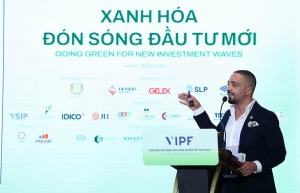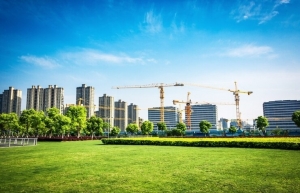Areas identified as pillars of a sustainable economy
According to Vu Minh Tien, member of the board at Viad Investment and Tourism Group, these three development pillars will equip Vietnam to tackle future challenges and build a sustainable, globally aligned economy.
 |
| Vu Minh Tien at the conference |
Tien made the remarks at VIR's annual sustainable development conference in Hanoi.
Regarding carbon credits in Vietnam, Tien views this as a market brimming with potential, especially highlighted in the past decade, yet hindered by a lack of regulatory frameworks to develop into a robust market.
“Currently, there is no legal framework to evaluate which projects are green or eligible for green credits, which leaves businesses uncertain in their application,” Tien said, “The good news is that by 2028, ministries will work together to establish a comprehensive carbon market, allowing Vietnam to engage in the international carbon credit market. This will harness our natural resources, labour, and management to reduce emissions, transforming carbon credits into a significant asset for our economy.”
To address the current regulatory gap, some financial institutions in Vietnam are adopting international standards, including SeaBank putting effort in applying similar standards to Indonesia, issuing green bonds, while BIDV is introducing green deposits.
Beyond regulations, Tien noted financial barriers as another dilemma hampering the carbon market's growth as expected in Vietnam.
“Carbon credits are a long-term journey, and finance is key,” he said. “Currently, non-governmental organisations, funds, and international banks are showing interest and offering financial packages that Vietnamese businesses can access.”
He also highlighted the fact that around 98 per cent of Vietnamese businesses are small or medium-sized and lack the financial strength for dual transit, and so support packages will be crucial to encouraging these enterprises towards the green transition.
Under the Paris Agreement, carbon credits are considered national assets and act as a tool for developed and developing nations to cooperate in emissions reduction. Higher-emitting nations must partner with lower-emitting countries to jointly build a market through carbon credit transactions.
In the real estate sector, Tien stressed that green real estate requires a forward-thinking approach from investors.
“To achieve true green real estate, covering transportation, infrastructure, electricity, renewable energy, and waste reduction, all elements must be green,” he explained. “This requires investors to see the long-term benefits of green real estate. When these benefits are substantial enough, businesses will adopt it without external persuasion. Planning needs to align with this from the outset, and currently, two-thirds of provinces in Vietnam have initiated green planning as directed.”
Tien believes that Vietnam’s real estate market trend, with a steady flow of investment, will not just focus on selling homes and infrastructure but on creating long-term value, building assets that contribute to sustainable societal development.
Looking ahead 10-15 years in e-commerce, Tien sees it as the fastest, most direct way to reduce carbon emissions by engaging in the e-commerce supply chain.
“In Vietnam, e-commerce is an effective tool to penetrate international markets, bypassing tariffs and technical barriers to access the EU, the US, and major importing countries,” he said. “Non-traditional e-commerce is truly a solution, requiring sustainable practices across processes such as packaging and consumption, meeting the rigorous standards of developed countries."
As e-commerce grows, small- and medium-sized Vietnamese businesses will gain effective distribution channels domestically and internationally, boosting Vietnam’s e-commerce sector, he added.
 | Green capital flowing into industrial real estate in Vietnam With billions of US dollars poised to invest in green industrial real estate projects, Vietnam has a significant opportunity to stand out and attract these green capital flows. |
 | Green trends at the fore in industrial real estate sector Green transformation refers to a shift towards a more sustainable future in the industrial sector. The transformation of industrial parks (IPs) into sustainable green ones is achieved by promoting green production, the efficient use of resources, and the exchange of energy and by-products among enterprises within the parks. |
 | Real estate cannot go global without green awareness Limited domestic supply of green materials and insufficient awareness of green real estate remain the most enduring challenges preventing Vietnam from participating more deeply in the global green real estate market. |
What the stars mean:
★ Poor ★ ★ Promising ★★★ Good ★★★★ Very good ★★★★★ Exceptional
Related Contents
Latest News
More News
- IP alterations shape asset strategies for local investors (January 22, 2026 | 10:00)
- 14th National Party Congress: Vietnam - positive factor for peace, sustainable development (January 22, 2026 | 09:46)
- Japanese legislator confident in CPV's role in advancing Vietnam’s growth (January 22, 2026 | 09:30)
- 14th National Party Congress: France-based scholar singles out institutional reform as key breakthrough (January 21, 2026 | 09:59)
- 14th National Party Congress: Promoting OV's role in driving sustainable development (January 20, 2026 | 09:31)
- 14th National Party Congress affirms Party’s leadership role, Vietnam’s right to self-determined development (January 20, 2026 | 09:27)
- Direction ahead for low-carbon development finance in Vietnam (January 14, 2026 | 09:58)
- Vietnam opens arms wide to talent with high-tech nous (December 23, 2025 | 09:00)
- Why global standards matter in digital world (December 18, 2025 | 15:42)
- Opportunities reshaped by disciplined capital aspects (December 08, 2025 | 10:05)

 Tag:
Tag:




















 Mobile Version
Mobile Version